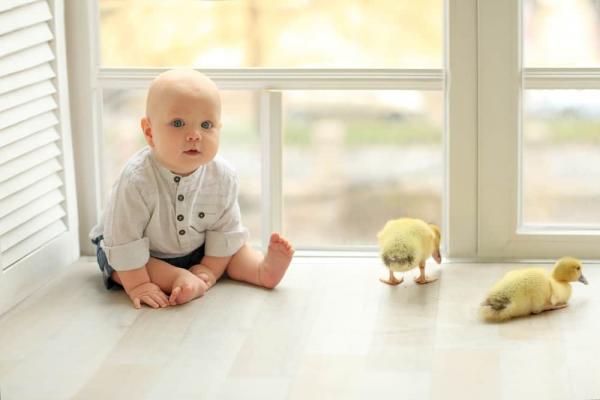
You know you need to put covers on your electrical outlets, buy a gate for your stairs and install latches for your cabinets before your new baby arrives. But what about those safety risks that are not evident to first-time parents? In the U.S., children up to 14 years old encounter many risks in their homes, resulting in nearly 21 million medical visits every year.
Here are four tips to add to your babyproofing guide that you probably aren't aware of:
1. Protect windows from harmful UV rays
One of the top myths about sun exposure is that UV rays can't penetrate windows. Older windows with single panes are especially dangerous, but even modern glass will only filter out UVB rays, not UVA rays. Those rays can burn skin, harm eyes and heat up a room.
How to babyproof
Protecting the windows in your baby's nursery will block out the majority of UVA rays and insulate the room during hot summer months. UV filtering blinds and shades can protect your baby from 75%-99% of harmful rays.
Also, put a sunshade on the window next to your baby's car seat - it's worth the small investment to help protect your baby's delicate skin when you're on the road.
2. Keep toxic houseplants out of reach
Most houseplants won't hurt your child even if she inquisitively chews on or swallows a leaf. Though just a bite or two of a toxic houseplant will only cause a stomachache, a plant consumed in large quantities can be more dangerous.
How to babyproof
Be careful about where you display dangerous plant varieties, and always keep the name tag on all plants in case you need to call poison control. Here are common plants that should be kept out of your child's reach:
Spring bulbs - such as daffodils and hyacinths - can be mistaken for a shallot or onion, and are often within a child's reach when they are started indoors.
Some varieties of lilies - like the calla lily and lily of the valley - need to be kept away from kids because of their toxic nature.
Though extremely popular because of its low light requirement, dumb cane earned its name because of its effects. It burns the tongue and swells the throat, making it difficult to speak.
The poison in invasive ivy can cause hallucinations, fever and a rash.
The nectar from aloe vera can heal burned skin, but it also has a laxative affect that causes diarrhea and vomiting.
3. Hack-proof the baby monitor
Cybersecurity expert John Sileo says that hacking into a baby monitor can be as easy as taking candy from a baby. Today's baby monitors that are Wi-Fi connected can be hacked when parents don't take the same security steps they would to guard their smartphones and other devices.
How to babyproof
Here are some guidelines to follow that will help keep your baby monitor safe from hackers:
- Buy a secure device
It's important that your baby monitor is manufactured by a company that values security. Numerous models offer extra protection against hackers.
- Use a strong password
Choose a password that is unique, long, specific to only your baby monitor and combines letters, numbers and characters. Never use the default password and device name.
- Register the device
Registering your monitor will keep you up-to-date on software upgrades and security breaches.
- Turn it off
Hackers have an easier time accessing devices that are always on.
4. Lock the dishwasher
Small children seem to love dishwashers. Closed dishwashers are lined with buttons to push, and they are fun to climb when they're open - as well as full of sharp knives, candy-shaped gel detergent packs and glass dishes.
How to babyproof
Parents magazine recommends keeping utensils pointed downward in a utensil basket and putting detergent inside only when you're ready to run the dishwasher.
Childproofing firm Safety Nook cautions parents to load breakables at the back of the dishwasher, where a child isn't likely to reach. Locking strapswill also keep curious kids from opening the dishwasher when it's closed.
Congrats new parents! You're well on your way to creating a safe environment for your new baby. Kids love to explore, and you can safeguard all aspects of their new environment to keep them safe and give you peace of mind.

